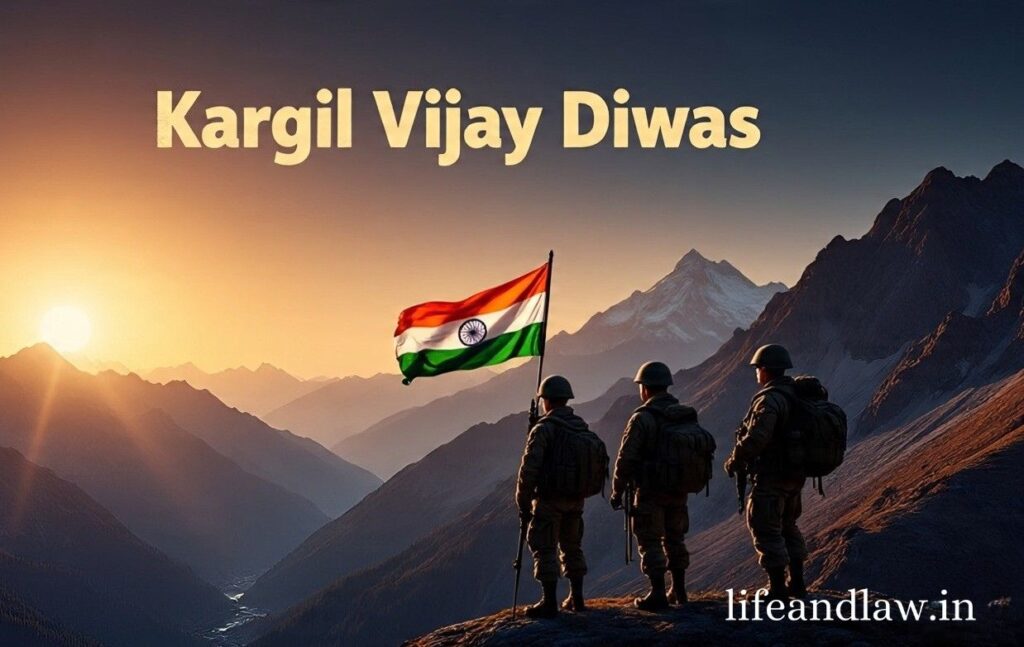Trending

On 26th July, India celebrates Kargil Vijay Diwas, an homage to our armed forces’ outstanding courage and sacrifice during the 1999 Kargil War. While this day appropriately remembers wars fought in harsh terrains, it also encourages reflection on the quiet strength, discipline, and endurance that define a soldier’s daily life. Their battlefield heroics are frequently recalled, but less is spoken about the legal rights and protections that they enjoy outside of conflict.
This article tries to offer light on the legal frameworks, constitutional provisions, and judicial safeguards that control and protect the lives of Indian military personnel—both during and after service. As we celebrate their bravery, it’s also critical to understand the legal frameworks that protect their dignity, welfare, and justice.
Members of the Indian Armed Forces face radically different situations than civilians. They face life-threatening situations, ensure national security, and stay politically neutral—all while adhering to a strict internal code of behavior. These specific circumstances demand a legislative framework that strikes a balance between operational efficiency and fundamental rights and safeguards. From disciplinary rules to pension entitlements, every part of their service is governed by the law.
The Constitution of India serves as the foundation for legal rights, but with certain limitations for the armed forces:
Article 33 enables Parliament to change the way basic rights are applied to members of the armed forces in the sake of discipline and duty.
Article 34 deals with martial law and offers compensation for actions taken to maintain public order.
This constitutional acknowledgment recognizes that, while military members are citizens, their duties may necessitate special legal treatment.
The Indian armed forces are governed by three fundamental statutes:
Army Act of 1950
Air Force Act of 1950
Navy Act of 1957
These laws establish the framework for military justice, including offences, punishments, court-martial procedures, and rules of behavior. Furthermore, under exceptional circumstances, legislation such as the Armed Forces (Special Powers) Act, 1958 (AFSPA) provides armed forces in “disturbed areas” with unprecedented authority, including arrest without a warrant and the use of force.
While these powers are intended to maintain order, they are also the subject of heated legal and human rights concerns.
While service members have limited rights, they are provided numerous legal protections:
Disciplinary safeguards: Soldiers accused of misbehavior have the right to a fair trial under the military justice system, which includes legal representation in court martial procedures.
Welfare and service protections: Laws and service regulations enable access to pensions, disability benefits, medical care, and rehabilitation for ex-servicemen.
Family Rights: The government offers measures to protect the interests of military families, such as ex gratia payments and educational advantages.
Importantly, many protections continue after retirement, acknowledging the long-term effects of military service.
To maintain hierarchy and cohesion within the military, certain fundamental rights are curtailed:
There is no right to unionize or strike.
Limited freedom of speech and political expression.
Limitations on public gatherings and criticism of superiors.
These constraints, while constitutional, can cause friction—particularly when troops find bureaucratic roadblocks in pursuing justice.
The judiciary has played an important role in determining the contours of military law:
In Naga People’s Movement of Human Rights v. Union of India, the Supreme Court upheld the legitimacy of AFSPA while establishing guidelines to prevent abuse.
In Union of India v. Harjeet Singh Sandhu, the Court highlighted due process in service-related terminations.
Recent verdicts have also expanded gender equality, including the 2019 Supreme Court decision allowing permanent commission to women officers in the Army.
Such actions ensure that the armed services uphold constitutional values while meeting operational requirements.
Despite legal provisions, some issues remain:
Pensions are delayed, and disability benefits are poorly implemented.
Mental health issues and suicides among soldiers.
Allegations of human rights violations in AFSPA areas.
Gender-based legal barriers to full participation and leadership positions.
These difficulties necessitate more comprehensive adjustments to the military justice and welfare systems.
To protect the dignity of persons in uniform, India must strengthen its legal ecology:
Establish an independent military ombudsman for grievance resolution.
Simplify pension and welfare legislation to ensure timely delivery.
Regularly examine rules like the AFSPA in light of changing democratic values.
Encourage legal literacy among service members and veterans.
Kargil Vijay Diwas serves as a poignant reminder of our armed services’ steadfast courage, discipline, and sacrifice. But commemorating our soldiers must go beyond formal gestures. It necessitates a commitment to assuring their justice, dignity, and legal protection throughout and after their service. As we honour the heroes of Kargil and the numerous others who defend our country, we must also work to strengthen the legal structures that protect their rights.
This article was written by Adv. Abdul Mulla, a practicing advocate who is highly concerned with public interest. He founded www.lifeandlaw.in, a platform dedicated to increasing legal awareness, and www.asmlegalservices, a practice focused on providing ethical and effective legal solutions.
Let this Kargil Vijay Diwas inspire not only remembering, but also reform.
Adv. Abdul Mulla (Mob. No. 937 007 2022) is a seasoned legal professional with over 18 years of experience in advocacy, specializing in diverse areas of law, including Real Estate and Property Law, Matrimonial and Divorce Matters, Litigation and Dispute Resolution, and Will and Succession Planning. read more….
Copyright BlazeThemes. 2025